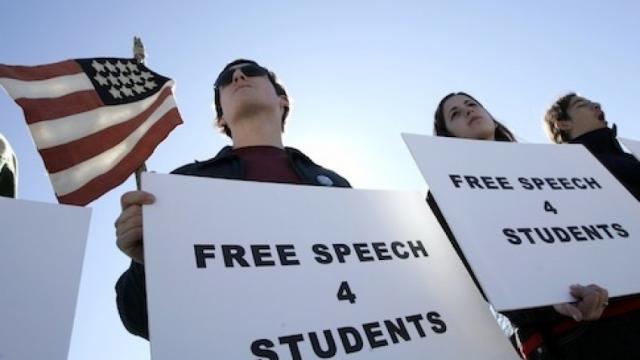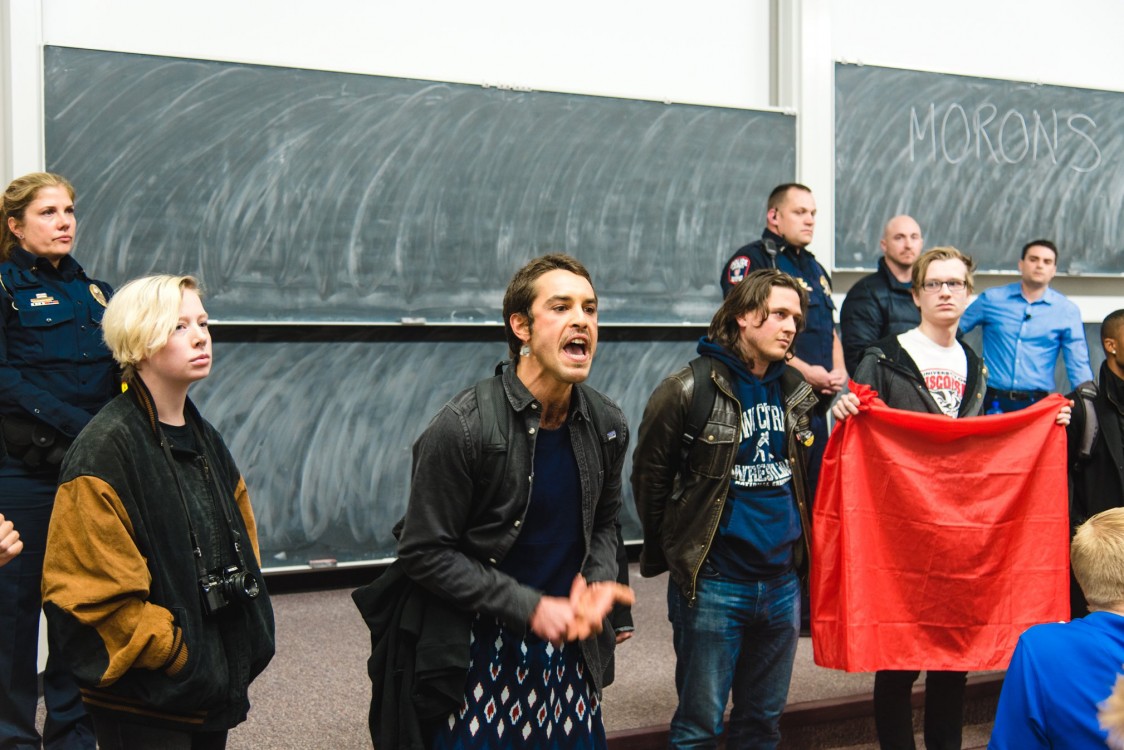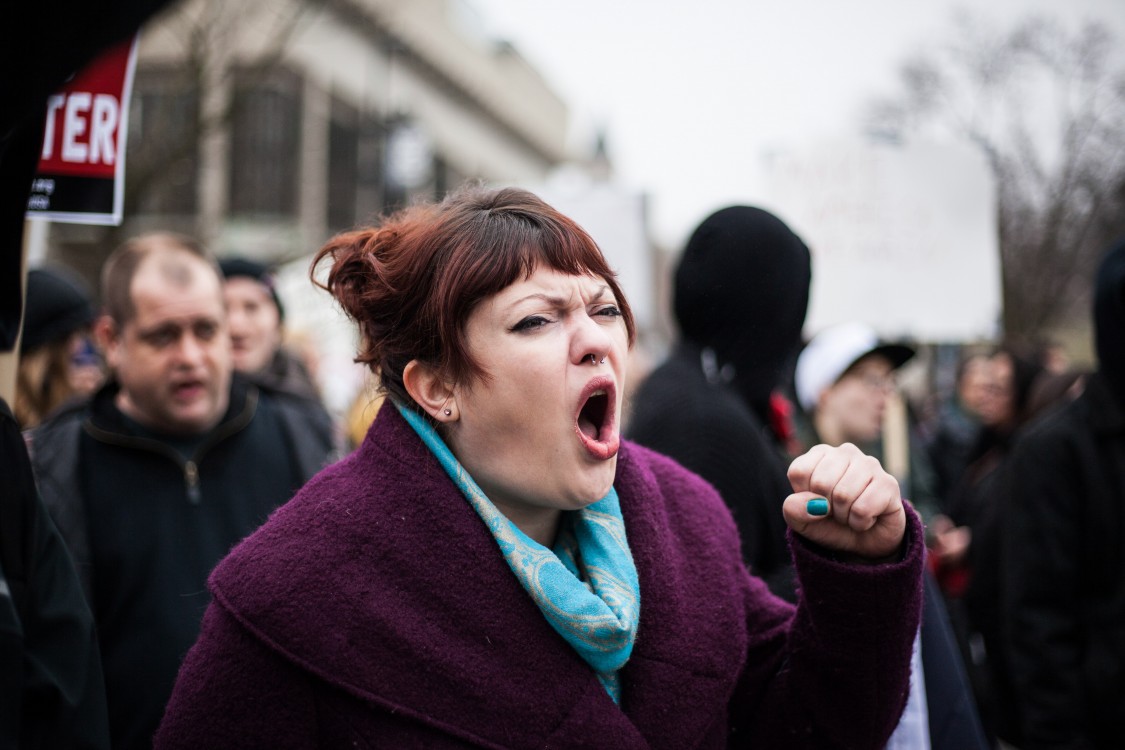
Universities across the country may be on the precipice of a new era in activism, politics and – in the most basic sense – expression.
Motivated in part by recent high-profile protests against controversial speakers, at least 10 states are currently considering some variation of a bill proposed by the conservative Goldwater Institute that would implement punitive measures for students involved in protests on campuses. The bill also curtails public universities' ability to take a stand on “controversial” issues – without providing a lot of guidance about what exactly these controversies may include.
The states proposing the bill – California, Colorado, Illinois, Louisiana, Michigan, Texas, Utah, Virginia, Wisconsin and North Carolina – have introduced slight variations of the original into their statehouses. But each bill is marked by gray areas and vague uncertainties that pose a serious threat to the very thing they seek to defend: free speech.
For example, take Wisconsin’s bill, the Campus Free Speech Act. Considering how smoothly the legislation progressed through the state’s Republican-dominated Assembly, it has generated a fair amount of confusion as to how exactly the law would work.
The bill, of course, maintains the Goldwater Institute proposal’s central goals: to curtail campus protest and limit university action relating to “controversial” issues – presumably issues the state GOP would like to ignore, like environmental research. But to do so, legislators have to outline what constitutes a violation to free speech rights. And by wading into the debate of what constitutes free speech, they only muddied the water further.
First, there’s the bill itself, which defines violators as “anyone… who engages in violent, abusive, indecent, profane, boisterous, obscene, unreasonably loud, or other disorderly conduct that interferes with the free expression of others.” The problems here are obvious: What constitutes disorderly conduct? What is the difference between loud and “unreasonably loud”?
Then there is the issue of “institutional neutrality.” In order for universities to comply with the bill, they must remain neutral “on the public policy controversies of the day” – a directive that has the potential to interfere with university policy, department curriculum and everyday instruction.
Supporters of the bill haven’t been particularly encouraging in their efforts to frame the law's reach, either. When one Democratic representative asked about how a geology professor might navigate the “controversies” clause while debating the Earth’s age with students who believe in Biblical chronology, Rep. Jesse Kremer, who authored the Campus Free Speech Act, seemed unable or unwilling to address the law's recklessly wide berth.
“The Earth is 6,000 years old,” Kremer responded. "That’s a fact.”
So, while the bill’s mechanics may not be clear, the bill’s intentions are.
Opposition to the bill has been widespread. Democratic Rep. Lisa Subeck argued that the legislation “creates an atmosphere of fear where free expression and dissent are encouraged.” And Bob Gannon, the sole Republican dissenter in the Wisconsin Assembly, said he is “afraid it’s going to intimidate students into silence – conservative students into silence.”
For Michael Newman, a media studies professor at UW-Milwaukee, the bill’s harsh penalties and reporting model were especially troubling.
“I could see this being used as a tool for harassment and abuse, for people to settle scores,” Newman told Occupy.com in a phone interview. “The way they’ve written it, any two people who complain about their concerns about someone's speech rights being violated… that triggers a hearing, a legal process that could eventually lead toward a student being suspended or expelled.”
The penalties doled out for speech violations under the bill would be harsh and inflexible, functioning like mandatory minimum sentencing laws with suspensions enforced at the second violation, no matter the severity. Students found guilty of three violations would be expelled.
This doesn’t necessarily guarantee a chilling effect on speech, though. Lee Abbott, a UW-Milwaukee graduate student and local organizer, isn’t talking about conceding any ground to alt-right guests on campus.
“I'm not reconsidering protest tactics on campus any more than I already participate in debates about the effectiveness of one set of tactics over another,” Abbott said over email. “The tactic of disrupting a speaker you disagree with has been something used by campus activists on the left and right for a long time.”
Abbott, who protested the 2016 Milo Yiannopoulos speech at UW-Milwaukee that became a ready example for Republican lawmakers, pointed out that counter-protests were more aggressive and threatening than the initial protests themselves, despite the lack of attention they received.
Yiannopoulos supporters, and Yiannopoulos himself, used “tech equipment to harass, target (literally placing cross-hairs over pictures of [protesters]), and intimidate his opponents who dared show opposition to him,” Abbott said. “If that isn't the spirit of ‘disruption’ and silencing political voices you disagree with, I don't know what is.”
For Newman, the Milo speech was a lightning rod event that signalled that the existing campus policies, and the First Amendment, were doing their jobs protecting both the event and the protests surrounding it.
“[Yiannopoulos] came to campus and singled out a student for harassment and abuse during his speech, and he was allowed to speak. There were protests, and everything went off as policies protect – for people to speak and to protest. There really was no issue of anyone being shouted down, there was no issue of anyone being denied their opportunity to speak,” Newman said, though he described Yiannopoulos’ targeted attack on a UW-Milwaukee student as “really troubling” and “hateful.”
If the Campus Free Speech Act emboldens conservative visitors to campus and protests persist, the result could be a showdown that lays bare the bill’s troubling framework for identifying and addressing speech violations on campus.
This foreseeable legal entanglement may also explain why the Wisconsin Senate has been particularly quiet in respect to the bill.
“I’m not even sure that they agree they should pass a law about this,” Newman added, noting that “if it becomes law, it’s likely to be challenged in the courts and found to be unconstitutional.”
The first Goldwater-inspired bill became law in North Carolina just last week, which may give life to the other nine states’ campus bills. For now, Wisconsin’s bill still awaits Senate approval. Whether or not it passes depends on a Senate in which Republicans outnumber Democrats nearly two-to-one.
Abbott, for his part, isn’t holding his breath. “It probably will [pass],” he said, “given the legislature's current demented leadership.”
3 WAYS TO SHOW YOUR SUPPORT
- Log in to post comments













